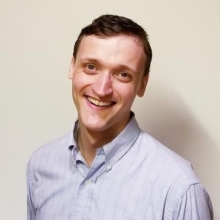CBE Seminar (Hybrid): The Long and Winding Road Toward Whole-Organ Engineering

Assistant Professor of Bioengineering
Stanford University
Non-UCI people, please use this registration link: https://forms.gle/xSy7arGQHCuXYukg6
Abstract: Congenital heart defects (CHD) are the most common issue for newborns in the U.S., with a prevalence of approximately 1%. Single ventricle disease, wherein a child is only born with a single functional ventricle, is a particularly serious form of CHD that can be partly managed by the Fontan procedure that connects both the right- and left-sided circulatory systems in series. While this can provide decades of near-normal life, the series circulation results in excessive central venous pressure and ultimately end-organ failure. We propose the construction of a living and beating cardiac biopump that can serve like a second ventricle to regularize the venous pressure. Achieving this will require billions of contractile cells that are arranged into a contractile chamber and supplied by a pervasive vascular system. In this talk, I will highlight recent advances in bioprinting that are unlocking the third dimension of tissue engineering, enabling tissues that are thick, viable, and replete with vascular networks. I will describe different methods to manufacture both large- and small-scale vascular networks, and I will lay out a roadmap towards whole-organ engineering.
Bio: Mark Skylar-Scott received his B.A. and M.Eng. degrees in engineering at the University of Cambridge in 2007. For his doctoral thesis under the guidance of Prof. M. Fatih Yanik at MIT, he developed multiphoton photopatterning techniques to print full length proteins on 2D surfaces and in 3D scaffolds to probe and direct neural and vascular growth. For his postdoctoral research at Harvard and the Wyss Institute with Prof. Jennifer Lewis, he performed 3D bioprinting of thick and vascularized tissues, and created new high-throughput multimaterial multinozzle 3D printing systems. Skylar-Scott is now an assistant professor of bioengineering at Stanford, a member of the BASE Initiative at the Children’s Heart Center and a Chan-Zuckerberg Biohub Investigator. His laboratory aims to develop new 3D printing hardware, wetware, and software to accelerate cardiovascular tissue engineering towards thick, vascularized, and functionally therapeutic organs.
Host: Professor Quinton Smith
Share
Upcoming Events
-
EECS Seminar: Less Compute, More Intelligence – Efficient and Autonomous Generative AI and Agents
-
MAE 298: Microscopic Robots that Sense, Act and Compute
-
CBE 298 Seminar: Interface Modification for Electrocatalysis
-
CEE Ph.D. Defense Announcement: Machine Learning and Remote Sensing for Environmental Modeling - From Large-Scale Streamflow Forecasting to Malaria Risk Mapping
-
CBE Special Seminar: Operando Electrochemical Methods at Dynamic Energy Materials Interfaces
